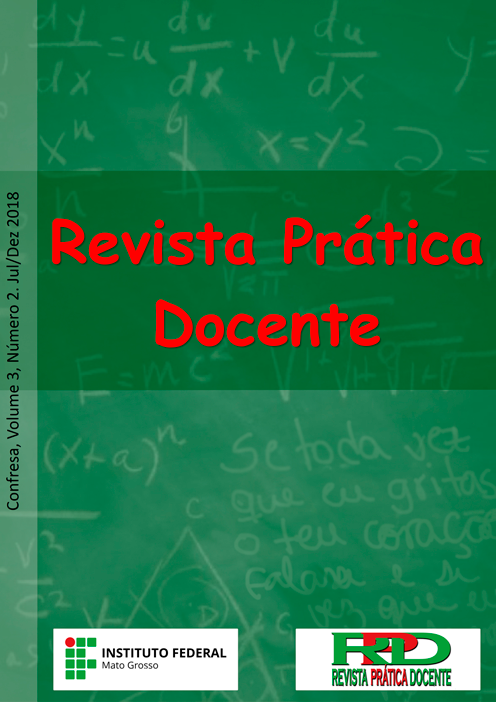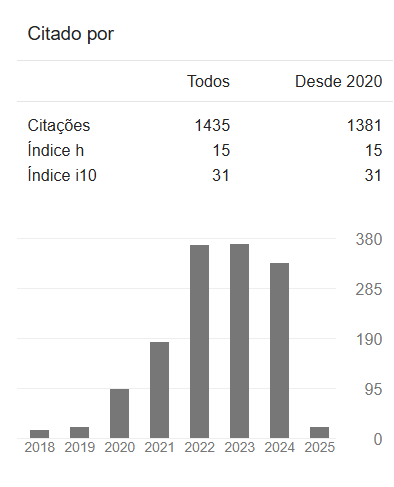IN JUDGMENT, THE USE OF PESTICIDES: STRATEGY USED TO TEACH CHEMISTRY TO STUDENTS OF THE 3RD YEAR OF HIGH SCHOOL IN A RURAL SCHOOL
DOI:
10.23926/RPD.2526-2149.2018.v3.n2.p610-624.id262Keywords:
Teaching strategy, Teaching chemistry, Simulated trialAbstract
This study describes the jury simulation on the use of pesticides by local agricultural production as a strategy to teach chemistry to students of the third year of high school at the Sol Nascente school in Confresa / MT. This is an experience report, with a qualitative approach, developed in 2018 and involving 11 duly enrolled students of this class. The choice of this theme was due to the repercussion of the Bill that changes the legislation on pesticides in Brazil. Before the simulated jury was held, the students were motivated to research the subject. The roles of the court were defined. Everyone was engaged in the development of research so they could play well the role for which they assumed in the simulation. At the end of the simulation, the jurors decided for the conviction of the farmer who used pesticides, by five votes in favor and two against. This strategy allowed to discuss concepts and consequences caused by chemical substances present in agrochemicals. With the development of this activity it is possible to affirm that the involvement by the studies and the search for information to support arguments was very constructive for the understanding of the chemistry, starting from the reality of the man of the field.
Downloads
Metrics
References
ANASTASIOU, L. G. C.; ALVES, L. P. Estratégias de ensinagem. In: ANASTASIOU, Léa das Graças Camargos; ALVES, Leonir Pessate. (Orgs.). Processos de ensinagem na universidade. Pressupostos para as estratégias de trabalho em aula. 3. ed. Joinville: Univille, 2004. p. 67-100.
AZEVEDO, M. O. de; QUARTIERI, M. T.; PINO, J. C. del; MARCHI, M. I. Júri Simulado e Phillips 66: Estratégias de ensino com alunos do 2º ano do Ensino Médio. Revista Prática Docente, v. 2, n.2, p. 179-196, 2017. Disponível em: <http://periodicos.cfs.ifmt.edu.br/periodicos/index.php/rpd/article/view/75>. Acesso em: 13 mar. 2018. DOI: https://doi.org/10.23926/RPD.2526-2149.2017.v2.n2.p179-196.id75
BRASIL. Lei Nº 7.802, de 11 de julho de 1989. Dispõe sobre a pesquisa, a experimentação, a produção, a embalagem e rotulagem, o transporte, o armazenamento, a comercialização, a propaganda comercial, a utilização, a importação, a exportação, o destino final dos resíduos e embalagens, o registro, a classificação, o controle, a inspeção e a fiscalização de agrotóxicos, seus componentes e afins, e dá outras providências. Disponível em: <http://www.planalto.gov.br/ccivil_03/LEIS/L7802.htm> Acesso em: 20 ago. 2018.
BRASIL. Projeto de Lei Nº 6299, de 13 de março de 2002. Altera os Art. 3º e 9º da Lei nº 7.802, de 11 de julho de 1989. Disponível em: <http://www.camara.gov.br/proposicoesWeb/prop_imp;jsessionid=61E13968E555F9ECE0C3E38700CA3AEE.proposicoesWeb2?idProposicao=46249&ord=1&tp=completa> Acesso em: 20 ago. 2018.
FONSECA, T. M. M. Ensinar e Aprender: pensando a prática pedagógica. Ponta Grossa: SEED/PR, 2008. Disponível em: <http://www.diaadiaeducacao.pr.gov.br/portals/pde/arquivos/1782-6.pdf>. Acesso em: 19 jul. 2018.
GIL, A. C. Didática do ensino superior. 1. ed., 7. Reimpressão. São Paulo: Atlas, 2012.
LEÃO, M. F.; QUARTIERI, M. T.; MARCHI, M. I. Julgamento Simulado sobre Aditivos Alimentares como Estratégia para Aprofundar os Conceitos Químicos. Destaques Acadêmicos, v. 05, p. 105-113, 2013. Disponível em: <http://www.univates.br/revistas/index.php/destaques/article/view/329>. Acesso em: 18 jul. 2018.
LEÃO, M. F. Ensinar Química por meio de alimentos: possibilidades de promover Alfabetização Científica na Educação de Jovens e Adultos. 2014. Dissertação (Mestrado em Ensino). Programa de Pós-Graduação em Ensino – PPGEnsino. Centro Universitário UNIVATES. Lajeado, 2014.
LEMOV, D. Aula Nota 10: 49 técnicas para ser um professor campeão de audiência. São Paulo: Da Boa Prosa e Fundação Iemann, 2011.
LOPES, R. J.; ALVES, G. Agrotóxico faz mal? É possível não usá-lo? Veja o que é verdade e mentira no debate. Folha de São Paulo, São Paulo, 3 ago. 2018. Disponível em:<https://www1.folha.uol.com.br/ciencia/2018/07/agrotoxico-faz-mal-e-possivel-nao-usa-lo-veja-o-que-e-verdade-e-mentira-no-debate.shtml>. Acesso em: 5 ago. 2018.
LOPES, C. V. M.; KRÜGER, V.; DEL PINO, J. C.; SOUZA, D. O. G. Concepções de professores de Química sobre a natureza do conhecimento científico. Acta Scientiae (ULBRA), v. 9, p. 3-16, 2007.
MEDEIROS, J. B. Redação Científica: a prática de fichamentos, resumos e resenhas. 6. ed.. São Paulo-SP: Atlas, 2004.
MORAES, R.; RAMOS, M. G.; GALIAZZI, M. do C. Pesquisa em sala de aula: fundamentos e pressupostos. In: MORAES, Roque, LIMA, Valderez Marina do Rosário. Pesquisa em sala de aula: tendências para a educação em novos tempos. Porto Alegre: EDIPUCRS, 2012. p. 11-20.
REAL, L. M. C.; MENEZES, C. Júri simulado: possibilidade de construção de conhecimento a partir de interações em um grupo. In: NEVADO, R.A.; CARVALHO, M.J.S.; MENEZES, C.S. (Org.). Aprendizagem em rede na Educação a Distância: estudos e recursos para formação de professores. Porto Alegre, RS: Ricardo Lenz, 2007.
Downloads
Published
How to Cite
Issue
Section
License
Copyright (c) 2023 A Revista Prática Docente tem o direito de primeira publicação

This work is licensed under a Creative Commons Attribution-NonCommercial 4.0 International License.
Authors who publish in this journal agree to the following terms:
- Authors retain the copyright and grant the journal the right of first publication, with the paper simultaneously licensed under the Licença Creative Commons Attribution allows the sharing of the work with acknowledgment of authorship and initial publication in this journal.
- Authors are authorized to take additional contracts separately, for non-exclusive distribution of the version of the work published in this journal (e.g. publish in institutional repository or as a book chapter), with acknowledgment of authorship and initial publication in this journal.











